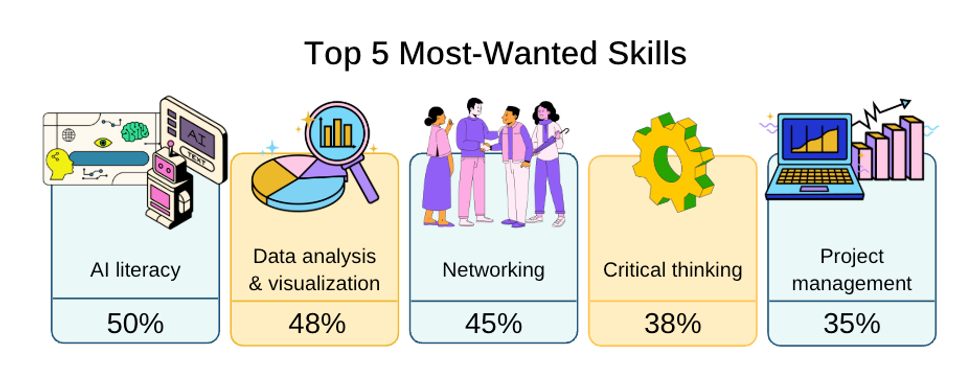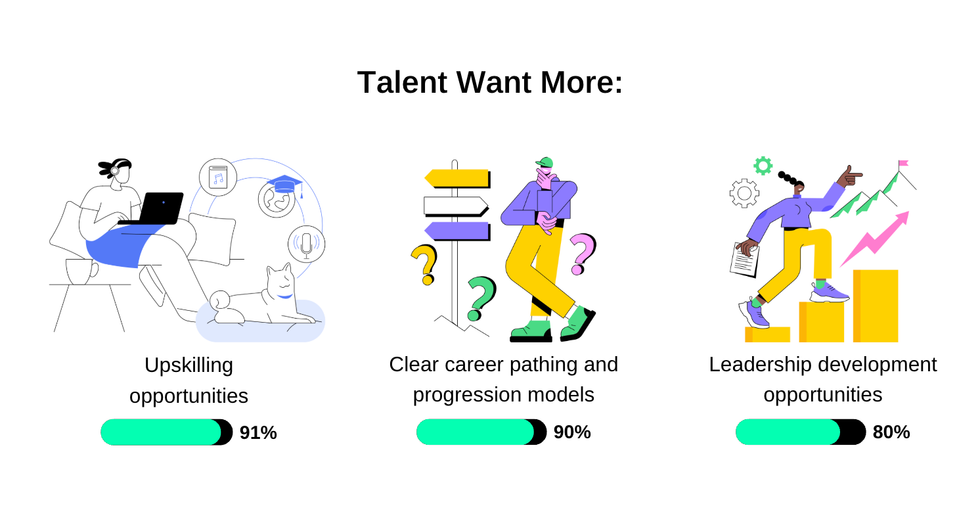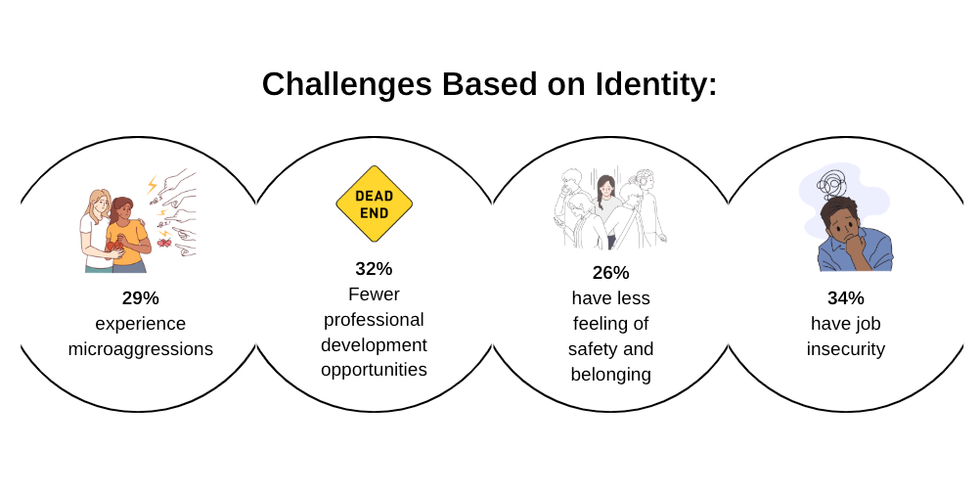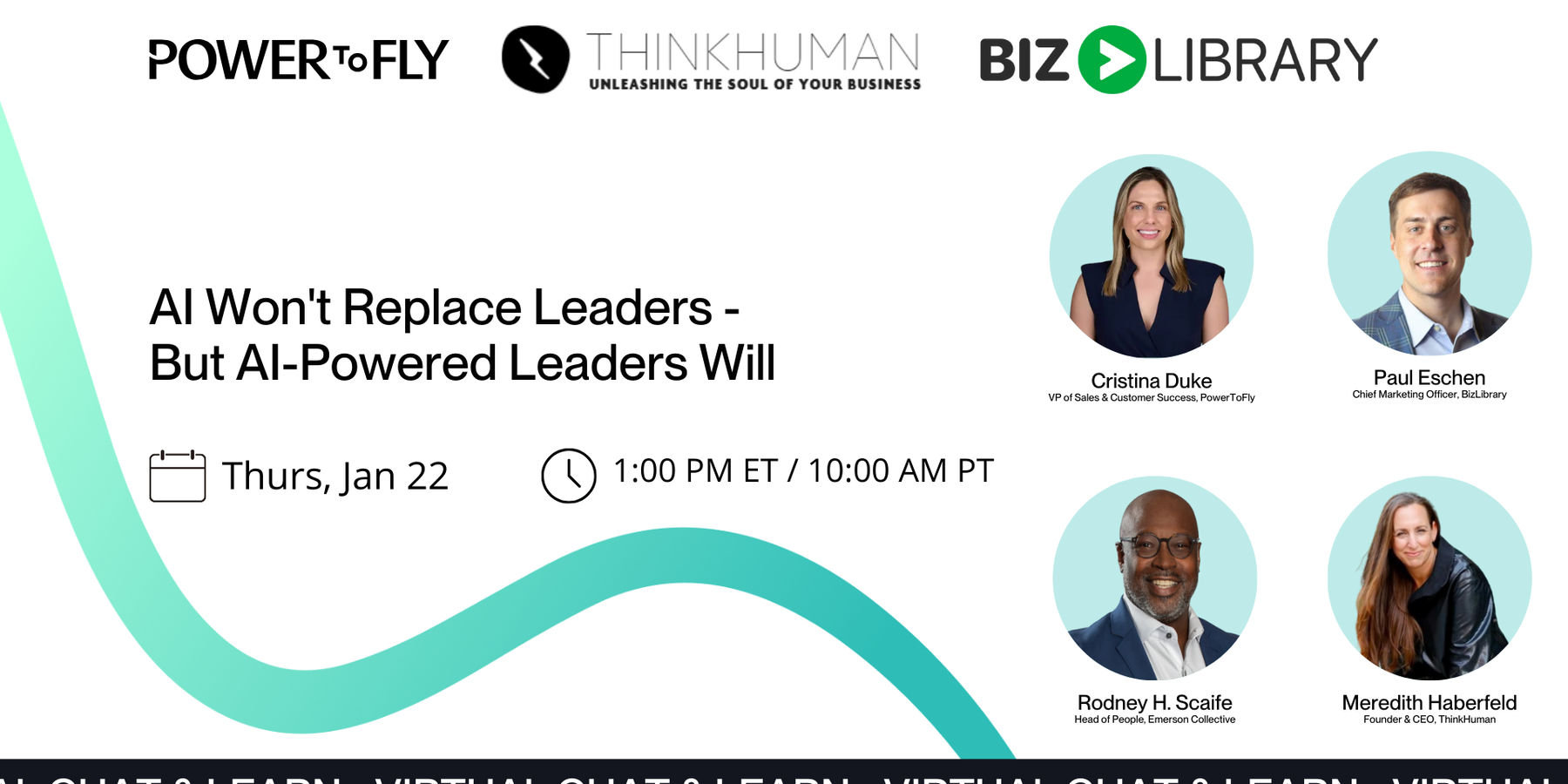92% of employees told us they would quit their job for one with better flexibility.
If that number surprises you, it shouldn’t. Workplace expectations in 2025 are shifting in ways that demand more flexibility, adaptability, and inclusivity. AI is reshaping roles, employees are asking for more skill development, and leaders are being challenged to adapt to hybrid, in-person, and quasi-distributed workforces where two days are (truly) never the same.
At PowerToFly, we’ve been keeping a close eye on these shifts. And thanks to our latest What Talent Wants in 2025 survey, we have firsthand insights into what professionals are looking for from the future of work.
What we’ve found is clear: The workplaces that thrive in 2025 will be those that balance cutting-edge technology with human-centered approaches. Let’s dive into the biggest workplace trends shaping this year — and how talent is responding.
AI integration is accelerating (and employees are on board)

AI is no longer just a fancy add-on; you’ll find it embedded in everyday workflows. (We like to think of it as the workplace equivalent of the calculator. Once a game-changer for math, it’s now an essential tool no one thinks twice about.)
Think of AI as the ultimate co-worker; it handles the repetitive stuff so employees can focus on big-picture thinking, creative problem-solving, and human connections.
And the line between "AI-enabled" and "traditional" jobs? It’s disappearing fast. In the future of work, AI literacy is quickly becoming as fundamental as knowing how to send an email.
The good news: employees are paying attention. They see where things are headed, and they’re asking for training that keeps them competitive. AI isn’t replacing them — it’s changing what’s expected of them. That’s why more professionals are demanding opportunities to upskill, with AI at the top of their learning lists.
📈 91% of respondents in our survey emphasized the importance of upskilling, with AI literacy ranking as their top priority.
In the future of work, skills are the new currency

Degrees aren’t the golden ticket they used to be. The real game-changer? Skills.
More and more companies are ditching rigid degree requirements and focusing on what employees can do, not just what’s on their diplomas. This shift is fueling a movement called skills-based hiring, where demonstrated abilities in AI, digital collaboration, and problem-solving carry more weight than formal credentials.
And employees are on board. They know that keeping up in today’s workplace means constantly learning and adapting (see above on AI skills!). And they’re paying close attention to which employers are offering opportunities to upskill.
📊 An overwhelming 91% of respondents stressed the importance of upskilling in their workplace. Translation? If businesses want to retain their best people, they need to prioritize learning opportunities.
Upskilling platforms that let employees customize their learning journeys — like PowerUp — will be essential in helping organizations meet this demand and stay competitive.
Employees are feeling detached, and companies need to fix it
A troubling trend has emerged in recent years: The Great Detachment. Unlike the 'Great Resignation,' where employees voluntarily left jobs in record numbers, many workers in 2025 feel stuck. A cooling job market and rising inflation means employees who might otherwise seek new opportunities are staying put — but they’re not happy about it.
Instead, they’re disengaged, unmotivated, and feeling disconnected from their work.
📉 Only 36% of professionals in our survey believe their leaders are capable of supporting career growth, with women and Black employees reporting the lowest satisfaction levels.
Why are so many employees feeling this way? It’s a combination of factors.
We’re still feeling the aftershocks of rapid organizational changes from 2020, the growing pains of remote and hybrid work, and the back-and-forth push for in-office returns. Without tangible career growth opportunities, many workers feel like they’re treading water rather than moving forward.
Our survey also showed how confidence in job security has dropped from 60% in 2023 to 37% in 2025, indicating increased worker anxiety.
The solution sounds simple on paper, but it takes a concerted effort from employers: re-engagement. This means setting clear role expectations, creating opportunities for team bonding, and strengthening relationship management at all levels. Employees want to feel connected to their colleagues and leaders, and companies that encourage meaningful work will be the ones that retain top talent.
Inclusion needs to be baked into the business

Despite political and corporate shifts away from diversity, equity, inclusion, and belonging (DEIB) initiatives, employees still value inclusive workplaces.
Naming aside, the ask is clear: People want to work in an environment where they feel respected, valued, and empowered.
And there’s still more work to do.
👀 Just 18.5% of respondents were satisfied with their company's current workplace inclusion efforts, indicating a lack of visible and influential leadership in promoting inclusive cultures.
Even more, nearly 30% of survey respondents reported frequently experiencing microaggressions, highlighting the lack of psychological safety in their organizations.
So how do we fix the problem? In 2025, inclusion needs to be upgraded from “hitting hiring targets” to embedding equitable practices into every aspect of a company’s structure. That means skill-based hiring, clear career pathing, mentorship programs, and leadership that reflects the diversity of its workforce.
Lack of flexibility will be a deal breaker
While some companies continue to push for return-to-office (RTO) mandates, our survey data tells a different story: employees overwhelmingly want hybrid or flexible work options. And they’re willing to leave jobs that don’t offer them.
🏠 92% of employees said they would quit their job for one with better flexibility.
This is especially critical for caregivers — who make up 40.5% of our survey respondents — as well as women, who prioritize flexible scheduling even more than men. Companies that ignore this demand risk losing top talent to more adaptable competitors.
The way we see it, hybrid work requires more strategy than a simple “we split our time between home and the office.” Companies will have to develop more thoughtful approaches to collaboration and team dynamics. Think physical offices shifting into intentional spaces (or “collaboration hubs”) for connection, while technology creates smoother, more integrated experiences for both remote and in-person employees.
Cue virtual reality brainstorming sessions!
Mental health & well-being are non-negotiable
Burnout is still a major issue in 2025, and employees are looking for companies that take mental health seriously.
🧠 45% of respondents identified mental health as a key workplace priority.
But a wellness stipend or an occasional day off isn’t enough; organizations must build well-being into the structure of work itself.
What does that look like?
Popular initiatives for 2025 will include structural changes to distribute workloads, flexible working hours, and removing the stigma around mental health conversations in the workplace. We’ll also see a focus on emotional intelligence training for leaders to pinpoint problems before they escalate and lead with empathy. (By the way, we offer a great training on Emotional Intelligence for Leaders through PowerUp.)
Leadership needs to evolve for the hybrid era
The shift to hybrid and remote work exposed a leadership gap.
Many managers were trained for in-office environments and are struggling to adapt to distributed teams. Employees, meanwhile, are demanding leaders who are more transparent, communicative, and people-focused.
📊 Only 37% of employees in our survey feel that their leaders are effectively supporting their career growth.
Successful leadership in 2025 requires emotional intelligence, adaptability, and a commitment to mentorship. Companies should invest in leadership training through platforms like PowerUp to prepare managers for this hybrid era.
The result? We’ll see a new breed of leaders arise — one that can effectively boost camaraderie between employees scattered across time zones.
This is how we picture it: A manager leading a hybrid team starts each week with a quick async check-in, where employees share priorities and blockers in a shared workspace. Instead of micromanaging, they use outcome-based performance metrics. They also make time for informal ‘coffee chats’ to replace the lost watercooler moments.
The takeaway: The future of work is both high-tech and high-touch
If there’s one thing our What Talent Wants in 2025 report makes clear, it’s that the best workplaces of the future will strike a balance between technology and human connection. AI may be accelerating change, but professionals still crave leadership, flexibility, and purpose in their work.
Businesses that embrace these trends — rather than resist them — will be the ones that attract and retain top talent in 2025 and beyond.
🔍 Want to dive deeper into these insights?
Download the full What Talent Wants in 2025 report below:
How to build a talent pipeline for AI roles
- AI integration is accelerating (and employees are on board)
- In the future of work, skills are the new currency
- Employees are feeling detached, and companies need to fix it
- Inclusion needs to be baked into the business
- Lack of flexibility will be a deal breaker
- Mental health & well-being are non-negotiable
- Leadership needs to evolve for the hybrid era
- The takeaway: The future of work is both high-tech and high-touch








